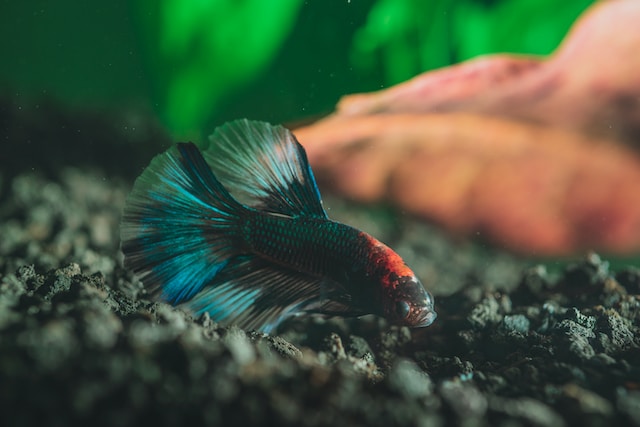Table of Contents
If you’ve noticed your betta fish spending a lot of time at the bottom of the tank, you may be wondering what’s going on. There are a few reasons why your betta might be exhibiting this behavior, and it’s important to understand what’s causing it so you can take appropriate action.
One possible reason your betta is at the bottom of the tank is that it’s feeling stressed or unwell. Bettas are sensitive to changes in their environment, and if something is off in their tank, they may become stressed and retreat to the bottom. Poor water quality, incorrect temperature, and overcrowding are all factors that can contribute to stress in bettas.
Another reason your betta may be at the bottom of the tank is that it’s simply tired or resting. Bettas are active fish, but they also need plenty of rest. If your betta has been swimming around a lot, it may be taking a break at the bottom of the tank. However, if your betta is spending all of its time at the bottom and not moving much, it’s worth investigating further to make sure there isn’t an underlying health issue.
Possible Health Issues
If you notice your betta fish lying at the bottom of the tank, it could be a sign of a health issue. Here are some possible health issues that could cause your betta fish to stay at the bottom of the tank:
Swim Bladder Disease
Swim bladder disease is a common health issue in betta fish. It occurs when the swim bladder, which is responsible for controlling the fish’s buoyancy, becomes damaged or infected. Symptoms of swim bladder disease include difficulty swimming, floating on one side, or staying at the bottom of the tank.
To treat swim bladder disease, you can try feeding your fish a diet that is high in fiber or fasting them for a few days. If the symptoms persist, you may need to consult a veterinarian.
Constipation
Constipation is another common issue that can cause your betta fish to stay at the bottom of the tank. It occurs when the fish’s digestive system becomes blocked, preventing them from passing waste. Symptoms of constipation include a swollen belly and a lack of appetite.
To treat constipation, you can try feeding your fish a diet that is high in fiber or fasting them for a few days. You can also add a small amount of Epsom salt to the water to help relieve constipation.
Ammonia Poisoning
Ammonia poisoning can occur when there is too much ammonia in the water. This can happen if the tank is not properly cycled or if the water is not changed frequently enough. Indications of ammonia poisoning comprise lethargy, loss of appetite, and remaining at the bottom of the tank.
To treat ammonia poisoning, you should immediately change the water in the tank and make sure that the tank is properly cycled. You can also add a water conditioner to help neutralize the ammonia.
Remember to keep an eye on your betta fish and monitor their behavior and symptoms. If you notice any changes or persistent issues, it’s best to consult a veterinarian for proper treatment.
Tank Conditions
When your betta fish is at the bottom of the tank, it could be due to poor tank conditions. Here are some things to consider:
Water Temperature
Betta fish are tropical in nature and necessitate a water temperature between 76°F and 82°F (24°C to 28°C). If the water is too chilly, your betta fish may exhibit lethargy and remain at the bottom of the tank. Utilize a dependable aquarium thermometer to scrutinize the water temperature.
Water Quality
Betta fish are responsive to water quality; thus, it is crucial to maintain a clean tank. Conduct regular water changes to eliminate any accumulation of ammonia, nitrites, and nitrates. Betta fish thrive in slightly acidic water with a pH between 6.5 and 7.5. Employ a water testing kit to scrutinize the water quality.
Tank Size and Decor
Betta fish necessitate a minimum tank size of 5 gallons (19 liters) with an abundance of hiding places and swimming space. If the tank is too cramped or congested with decorations, your betta fish may encounter stress and remain at the bottom of the tank. Furnish a few hiding spots, but also allocate some open space for swimming.
By ensuring the proper water temperature, water quality, and tank size and decor, you can help prevent your betta fish from staying at the bottom of the tank.
Dietary Factors
Your betta fish may be at the bottom of the tank due to dietary factors. Bettas are carnivorous fish and require a high-protein diet to thrive. If your betta is not receiving enough protein in their diet, they may become lethargic and spend more time at the bottom of the tank.
Make sure you are feeding your betta a high-quality pellet or flake food that is specifically formulated for bettas. These foods should contain at least 40% protein and be the primary source of nutrition for your betta.
Apart from pellets or flakes, you can enhance your betta’s diet with frozen or live foods such as bloodworms, brine shrimp, or daphnia. These foods are high in protein and can help keep your betta healthy and active.
Be careful not to overfeed your betta, as this can lead to health problems and a buildup of waste in the tank. Feed your betta small meals twice a day, and remove any uneaten food after a few minutes.
If you suspect that your betta’s diet is the cause of their lethargy, try adjusting their feeding schedule or adding more protein-rich foods to their diet. With the right nutrition, your betta should become more active and spend less time at the bottom of the tank.
Stress Factors
If your betta fish is at the bottom of the tank, it could be due to various stress factors. Stress can cause your fish to feel anxious and lethargic, which can lead to them spending more time at the bottom of the tank.
One of the major stress factors for betta fish is poor water quality. If the water in your tank is not clean and well-maintained, it can cause stress and lead to health problems for your fish. Make sure to regularly clean your tank and change the water to avoid this issue.
Another common stress factor is overfeeding. Feeding your betta fish too much or too often can lead to digestive issues and stress. Make sure to feed your fish the appropriate amount of food, and only once or twice a day.
Furthermore, betta fish may experience stress if they lack sufficient space to swim or if their tank is overcrowded. Make sure your tank is appropriately sized for your fish and avoid adding too many fish to the tank.
How to Help Your Betta Fish
If you notice your betta fish at the bottom of the tank, there are a few things you can do to help.
Medical Treatment
If your betta fish appears sick, it may be necessary to seek medical treatment. Some common illnesses that can cause a betta fish to be lethargic include swim bladder disease, fin rot, and velvet. A veterinarian who specializes in fish can help diagnose and treat these conditions.
Improving Tank Conditions
Poor water quality can also cause a betta fish to be lethargic. Make sure you are regularly cleaning the tank and changing the water. Additionally, betta fish prefer warm water, so make sure the tank is heated to the appropriate temperature. Adding plants and decorations can also help create a more stimulating environment for your fish.
Diet Adjustments
Finally, your betta fish’s diet may also be a factor. Make sure you are feeding your fish a balanced diet of high-quality pellets and occasional treats like bloodworms. Overfeeding can also cause health problems, so make sure you are not giving your fish too much food.
By taking these steps, you can help improve your betta fish’s health and well-being.
When to Consult a Veterinarian
If your betta fish is at the bottom of the tank and shows signs of illness, you may want to consult a veterinarian. Here are some situations where a visit to the vet may be necessary:
- Persistent lethargy: If your betta fish is constantly at the bottom of the tank and is not swimming around or eating, it may be a sign of a serious illness. This can be caused by a bacterial or viral infection, parasites, or other health issues.
- Abnormal behavior: If your betta fish is behaving abnormally, such as swimming erratically or gasping for air at the surface of the water, it may be a sign of a health problem. This can be caused by poor water quality, an injury, or a disease.
- Visible symptoms: If your betta fish is showing visible symptoms such as discoloration, bloating, or lesions, it may be a sign of a health problem. These symptoms can be caused by a variety of issues, including bacterial or fungal infections, parasites, or other diseases.
If you notice any of these signs in your betta fish, it is important to consult a veterinarian as soon as possible. A qualified veterinarian can diagnose the problem and recommend the appropriate treatment to help your betta fish recover.







